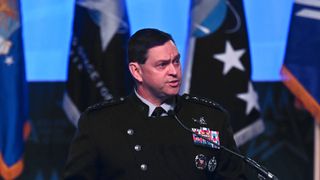The space around Earth is increasingly a site of military competition.
That's according to remarks made by the Chief of Space Operations for the U.S. Space Force, Gen. Chance Saltzman, during an address at the Air & Space Forces Association's Air, Space & Cyber Conference on Tuesday (Sept. 12). Saltzman told attendees that as the world's superpowers vie for control of space, the need for a Space Force is more pressing than ever.
"The domain is now more contested than at any other point in history," Saltzman said, according to a Space Force statement. "This was the genesis of the Space Force — a military service focused on addressing the challenges and opportunities we face in the space domain. We were created for this new space era — an era increasingly characterized by great power competition."
Related: The US Space Force has a new mission statement to secure everything 'in, from and to space'
Saltzman used the example of Russia's ongoing invasion of Ukraine to explain why the U.S. military needs a branch dedicated to defending the nation's assets in space such as GPS navigation systems, communications satellites and early warning missile launch constellations.
"We are living in complex strategic times, and space is critical at this inflection point," Satlzman said. "The conflict in Ukraine has made it clear: access to, and use of, space is fundamental to modern war. It is also clear that technology is not a force enabler on its own. It is about the readiness of the forces using that technology that will tip the scales toward success."
While Saltzman said that the creation of the Space Force was a vital first step, the service now needs to focus on refining its forces for great power competition. To be able to better respond to threats in space in a timely manner, the service has reorganized several units under a new command structure in which Guardians (the name for Space Force personnel) from Space Operations Command who operate GPS satellites or electromagnetic warfare systems designed to jam or degrade adversaries' satellite transmissions now work directly alongside their counterparts in Space Systems Command who are responsible for procuring hardware.
"We cannot afford to split a mission area's critical activities across organizational seams. Instead, it is essential that all elements of readiness — people, training, equipment and sustainment — fall into the same organizational structure," Saltzman said, according to SpaceNews.
The Space Force has been actively preparing to defend its assets in what is now the contested domain of Earth orbit. In recent months, the service has recently created a unit dedicated exclusively to targeting adversary satellites, has conducted "live fire" jamming exercises and trained with "simulated on-orbit combat."
Saltzman's comments about space being more contested than ever echo a statement made by General David D. Thompson, vice chief of space operations for the Space Force, who told The Washington Post in 2021 that U.S. satellites are under attack "every single day."
American, Russian and Chinese satellites have been engaging in cat-and-mouse maneuvers for years, making close approaches to one another's satellites to obtain images and other data to analyze their capabilities.
To help keep an eye on what is happening at the far reaches of Earth orbit, the Space Force recently launched the classified Silent Barker satellite, described by military leaders as a "watchdog" to keep an eye on United States satellites in orbit.


